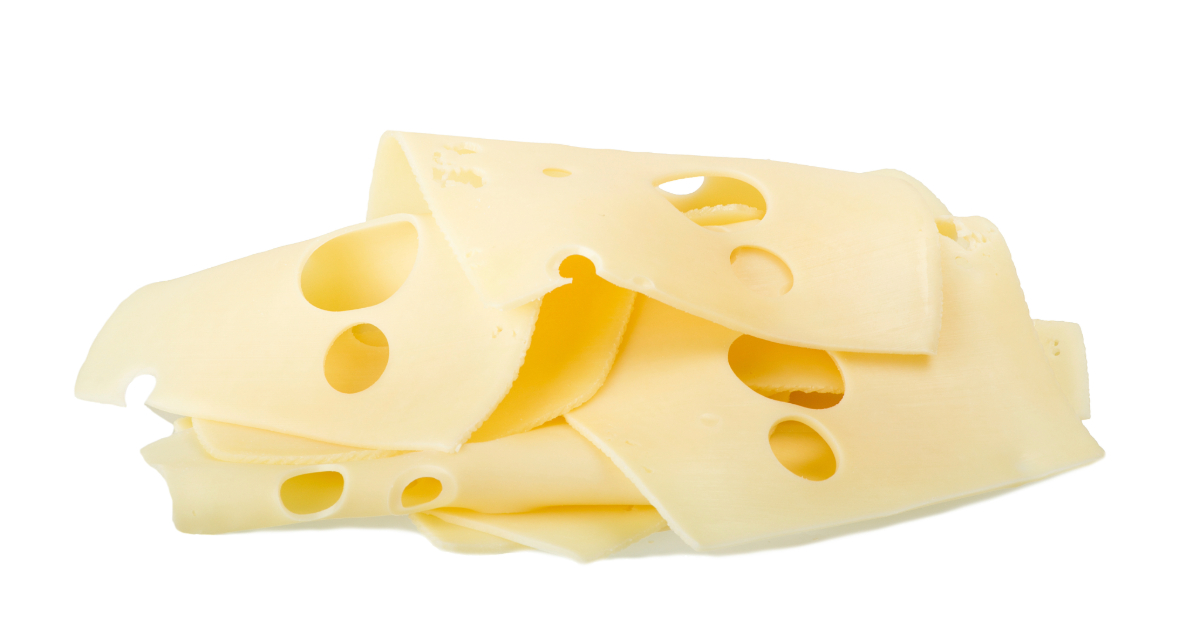Swiss cheese and American cheese - two iconic varieties that have graced sandwiches and burgers for decades.

But how exactly do they stack up against each other?
Ingredients and Production
The most striking difference between Swiss and American cheeses lies in ingredients and production methods.
Swiss Cheese
Authentic Swiss cheese like Emmentaler is made using just three ingredients:
- Milk
- Salt
- Bacterial cultures
The cultures play a key role in developing the distinctive holes and nutty flavor. As the wheel ages, gases released by the bacteria form pockets that become the signature "eyes".
American Cheese
American cheese has a more complex ingredient list:
- Milk
- Bacterial cultures
- Salt
- Food colorings (for that familiar yellow hue)
- Emulsifiers like sodium citrate (improves melting)
- Preservatives
- Whey protein concentrate
- Milk fats
- Extra milk proteins
These extra ingredients serve important functions. The emulsifiers allow American cheese to melt smoothly without separating. Preservatives give it a longer shelf life. And milk proteins plus whey boost the protein content.
So while less "pure", American cheese is engineered to have the ideal texture for melting and the extended fridge life that busy households need.
Key Takeaway: Swiss cheese is made purely from milk, salt and cultures. American cheese contains extra ingredients for texture and shelf life.
Nutrition
When it comes to nutrition, Swiss cheese delivers more protein and less fat per serving. But American cheese contains more calcium and vitamin D.
Calories and Macronutrients
- Per 100 grams:
- Swiss cheese contains 393 calories
- American cheese contains 366 calories
- Protein
- Swiss cheese has 26.96 grams
- American cheese contains 16.09 grams
- Fat
- Swiss cheese provides 30.99 grams
- American cheese has 23.06 grams
- Carbs
- Swiss cheese gives just 1.44 grams
- American cheese supplies 8.85 grams
So ounce for ounce, Swiss cheese packs over 10 extra grams of protein but 7 fewer grams of fat. It's also lower carb.
However, American cheese delivers a hefty calcium punch, with 1375mg per 100 grams — over 50% more than Swiss. It's also fortified with extra vitamin D.
Sodium
Both varieties are quite high in salt. Still, American cheese contains almost 300mg more sodium per 100 grams.
Key Takeaway: Swiss cheese is higher in protein, lower in fat and salt. American cheese provides more calcium and vitamin D.
Taste and Texture
When it comes to taste and texture, Swiss cheese and American cheese are miles apart. Swiss is rich, nutty and firm while American offers mild flavor and super-smooth melting.
Swiss Cheese
- Taste is complex, rich and nutty, with sweet hints mingling with earthy and savory notes
- Texture strikes an ideal balance – firm yet still pliable. Smooth and supple with scattering of holes
- Holes ("eyes") and firmer texture make it perfect for slicing
American Cheese
- Very mild, creamy flavor
- Ultra-smooth and slippery texture when melted
- Melts uniformly without clumping or separating
- Lack of holes enables clean, no-fuss melting
- Softer texture isn't designed for slicing
So Swiss cheese brings far more flavor complexity. But American cheese offers the ultimate melting texture required for perfect burgers and grilled cheeses.
Key Takeaway: Swiss cheese has strong, nutty flavor and firm yet pliable texture. American cheese is known for its very mild taste and seamless melting.
Best Uses
Their unique strengths make Swiss and American cheeses suited for different applications.
Swiss Cheese
With its pliable texture, rich nutty flavor and distinctive eyes, Swiss cheese pairs beautifully with:
- Charcuterie boards
- Salads
- Sandwiches
- Platters and cheese boards
- Fondue
- Quiches
- Sauces
American Cheese
American cheese is king when it comes to:
- Burgers
- Grilled cheese sandwiches
- Macaroni and cheese
- Cheese sauces
- Quesadillas
Thanks to its seamless melting and mild taste, it blends perfectly without overpowering other ingredients. The softness also makes it less suitable for cheese boards.
Key Takeaway: Swiss cheese suits applications where its firmer texture and strong flavor shine, like sandwiches and cheese boards. American cheese is the top choice where smooth, uniform melting is key.
Price Comparison
When it comes to cost, Swiss and American cheeses are similarly priced at the supermarket. You can expect to pay around $2 per 8-ounce package of either variety.
However, artisanal Swiss cheese made according to traditional methods can fetch far higher prices. Hand-crafted wheels of Emmentaler or Gruyere often retail for over $20 per pound.
With American cheese, you'll typically pay the same price regardless of brand. But smaller producers of Swiss cheese can command premium pricing.
FAQs
Is Swiss cheese healthier than American cheese?
Yes. Swiss cheese contains fewer calories, less fat, more protein and less sodium than American cheese per serving. However, American cheese provides substantially more calcium and is fortified with vitamin D.
What's the difference in taste?
Swiss cheese has a rich, nutty flavor while American cheese is extremely mild tasting.
Which cheese has holes?
Iconic "eyes" or holes are a signature trait of Swiss cheeses like Emmentaler. Lower fermentation temperatures keep American cheese hole-free.
Which cheese melts better?
American cheese has superior melting that is smooth and uniform without clumping or separating.
What cheese is used on cheeseburgers?
American cheese delivers the ideal melting, mild flavor and golden color for the quintessential burger cheese.
Conclusion
While both classic slices, Swiss cheese and American cheese inhabit different universes when it comes to taste and texture. Nutritionally, Swiss delivers more protein yet American offers extra calcium and vitamin D.
With its firmer body and rich nuttiness, Swiss cheese makes the perfect companion for cheese boards and sandwiches.
And thanks to custom emulsifiers allowing smooth, seamless melting, you can't beat American cheese for the grilled cheese or burger of your dreams.

